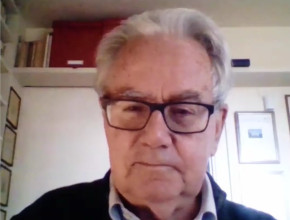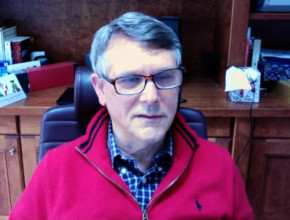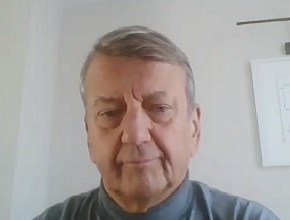Dr Jean-Louis Vincent, professor of intensive care medicine at Université libre de Bruxelles, past president of the World Federation of Societies of Intensive and Critical Care Medicine and the European Society of Intensive Care Medicine, accomplished author and researcher, joins Dr Roman Jaeschke to discuss the emerging, approved, and canceled treatment options for COVID-19.
For part 1, click here.
Roman Jaeschke, MD, MSc: Good morning. Welcome to another edition of McMaster Perspective with Professor Jean-Louis Vincent. We’ve spoken a little bit about the epidemiology of coronavirus disease 2019 (COVID-19) and the numbers that are still rising around the world. Do we have anything more to offer now compared with a month or two ago? The floor is yours.
Jean-Louis Vincent, MD, PhD: Thank you very much.
If we go back to the beginning, there was a big interest in hydroxychloroquine, following Didier Raoult’s suggestion that it could be a fantastic treatment for COVID-19. Now all the evidence that we have accumulated shows clearly that hydroxychloroquine does not work. Already several weeks ago we wrote an editorial in The Lancet saying that it didn’t work, but people wanted to have more evidence.
Of course, there was the sad story of a large epidemiological study showing no benefit and even some harm, but the data were put together by a small company. We should forget about these papers from the New England Journal of Medicine and The Lancet.
The RECOVERY (Randomised Evaluation of COVID-19 Therapy) trial from the United Kingdom, which is a very good trial and probably the largest in the field of prospective randomized controlled trials (RCTs) in COVID-19, showed that hydroxychloroquine does not bring any benefit. Today the World Health Organization (WHO) has decided to stop research on hydroxychloroquine and abandon any idea of giving it. The US Centers for Disease Control and Prevention (CDC) said already several days ago that there was no longer an indication for hydroxychloroquine in COVID-19.
But the other good news, or rather the only good news that came out very recently, comes also from the RECOVERY trial. This trial from the United Kingdom indicated that in patients who received moderate doses of dexamethasone, 6 mg per day for 10 days, there was a substantial reduction in mortality rates. The data have not been published yet, but we know that this is a very serious group of investigators, an excellent study protocol, and the numbers are really important and significant, with 2100 patients in the corticosteroid-treated group and 4300 patients in the standard treatment–alone group. There is a one-third reduction in mortality rates in the mechanically ventilated patients, and a one-fifth reduction in mortality rates in patients who are just receiving oxygen without mechanical ventilation. These data are very exciting. It’s good to know that dexamethasone is very cheap, so cost is not an issue. It’s not like with remdesivir, which may have a little bit of an effect but would cost quite a substantial amount of money.
Dexamethasone is cheap, not very harmful, and so we can recommend it in patients who are hospitalized with COVID-19. It should not be used at home—only in hospitalized patients.
We still have some interest in the administration of plasma. I have been keen to stimulate clinical trials on this in Belgium and in Europe. We are speaking about plasma from convalescent people, who had the virus and therefore have the antibodies in their blood. I am administrator of the Red Cross of Belgium, so we try to find these people and we have the plasma. So far, the data published on this have not been so exciting, I must say. But the data are limited. We need to wait for the big American trial. They are very well organized in the United States when it comes to this particular aspect and I think we’ll soon have some data on the administration of plasma from convalescent people.
Now there is a lot of interest in the production of antibodies, which is one step further. You could have antibodies coming perhaps from animals, from llamas in South America or maybe even from cows. These antibodies potentially could protect patients with severe forms of COVID-19. But it’s dangerous because there may also be some unwanted effects. It’s a touchy topic.
These are the new things. Another new thing is the influence of gender and sex. We all know that men are much more at risk of developing severe complications than women. This may be in part, as we discussed earlier [see Part 1], related to genetic factors. Perhaps the X chromosome protects. Men only have one X chromosome, coupled with the Y chromosome, and women have two X chromosomes. That could protect against the bad [progression] of the disease. Of course, we cannot do anything about our chromosomes, but what we could do is look at the influence of hormones. It seems that estrogens could potentially protect animals having COVID-19. On the other hand, male individuals taking antiandrogens for treatment of prostate cancer seem to be protected.
Just an hour ago I was talking to a company making estrogens. They want to start a trial, and I encourage them to do that, because that’s also quite cheap, quite simple, and quite safe. Taking estrogens for 2 or 3 weeks is not a big deal. And that could be potentially very appealing. So I’m looking forward to seeing more data on estrogen administration in male individuals.
Roman Jaeschke: One question coming back to the most recent news, which is steroids. Is there anything specific about dexamethasone? The dose of 6 mg is like 30 mg of prednisone or methylprednisolone.
Jean-Louis Vincent: We would intuitively say yes, the dose should matter, because we all know that the dose of corticosteroids is a very important issue. I won’t speak about very low doses, but what about going to higher doses? The problem is that high doses of corticosteroids may potentially limit the host’s response and promote the replication and development of the virus. So we have been quite skeptical about the administration of relatively large doses of corticosteroids in COVID-19 patients.
Roman Jaeschke: My question is whether it matters if it’s dexamethasone, prednisone, or something else.
Jean-Louis Vincent: Sure, I was coming to that. It probably doesn’t matter. Probably 30 mg of methylprednisolone or prednisone would do the same. Our English colleagues had to choose between the two and decided to go for dexamethasone. Since it is done with dexamethasone, I would not take any risk giving methylprednisolone rather than dexamethasone, because we all have dexamethasone widely available. If the supply was limited, I would then shift.
Roman Jaeschke: That’s what I was driving at. It’s quite amazing that we used to require network meta-analyses, meta-analyses of RCTs, then we went to publications of individual RCTs, then within the last 3 months we had a flurry of observational studies, and now we are even reacting to people saying they will publish something. Clearly the world is moving at a completely different speed. As an editor, do you have any observations on this?
Jean-Louis Vincent: We all realized that the number of submissions has increased substantially over the last months. We are reaching the end of the first half of the year and the number of submissions is equal to the number of submissions over the last year.
I’m not speaking about critical care only. Yesterday we had a meeting with the editorial board of the American Journal of Respiratory and Critical Care Medicine, the so-called Blue Journal. The comments were the same, and I know that in intensive care medicine and other journals it’s also like that.
COVID-19 allowed many people to gather material. It’s not always rocket science, but our colleagues from Wuhan or other big Chinese cities could rapidly collect data from a relatively large number of patients. Unfortunately, many of these papers are a little bit descriptive, looking at prognostic factors. Indeed, age, diabetes, hypertension, obesity—these are factors that may increase the risk of having severe cases, but so what? What can you do about it?
Roman Jaeschke: It’s better to be young and healthy than older and sick, that’s for sure.
Jean-Louis Vincent: And then they come up with C-reactive protein (CRP) and ferritin.
Roman Jaeschke: But so what?
Jean-Louis Vincent: In terms of treatment, since I mentioned the coagulation variables, it’s interesting to emphasize that we understand COVID-19 is not just a lung disease. It’s a kind of endotheliopathy; some people call it endotheliitis, but I prefer endotheliopathy. There are microthrombi and anticoagulation is very important. So we are now more generous with anticoagulation than some weeks ago.
Many people, including me, would love to have our activated protein C or thrombomodulin available. That’s the type of intervention that we would like to apply, because it acts on the interaction between coagulation and inflammation. That’s really something that we would have liked to see.
Roman Jaeschke: A very unfair question: If you had a really sick person in your intensive care unit (ICU) these days, what would you like to have at your disposal? I’m not asking what you’re using. But if you were alone, making this decision yourself, and you had everything available, what would you give?
Jean-Louis Vincent: It’s a very important question. Sometimes people tend to give drugs that have not been shown to be efficacious. This has been the big problem with hydroxychloroquine. With all the fuss around it, patients or families (or both) wanted us to give hydroxychloroquine to our patients in the ICU, which we reluctantly did to please them. We didn’t want to do it, and now of course we no longer do that. This prevented randomization of these patients in clinical trials, because usually it was a contraindication. So it’s a big issue. We have not made enough progress with our prospective RCTs for that particular reason.
There’s also VIP medicine. We had a VIP in our unit, many people knew that person and everybody offered their opinions. I was called at home at 11 PM: “Jean-Louis, you need to insist we need to give tocilizumab to this patient, because there’s a cytokine storm!” And I said we shouldn’t do that. It should be part of a clinical trial. “But this is Mister So-and-So!” No—it doesn’t matter. The son of this patient asked for a transfer to another institution, where he received the anti-interleukin-6 (IL-6) and unfortunately died thereafter. He could have died in our department too, but it’s just to say that people want to get something and cannot accept that there’s nothing available for treatment.
My friends for minor cases often say, “So there’s only paracetamol [acetaminophen], right?” “No, don’t take paracetamol. Why do you want to take paracetamol?” “For fever.” “Fever can be good, my friend. You could take some paracetamol if fever really creates substantial discomfort, it’s OK for you and for your comfort. But not to treat the disease.” Fever is rather protective. The virus doesn’t like fever. The virus doesn’t like higher temperature.
In terms of treatment, right now there’s only dexamethasone. I hope I could say there’s plasma, I hope I could say we could use extracorporeal systems to remove mediators in excess—and this is used quite often now in the United States, Europe, and elsewhere, but without real data. We need good studies. Otherwise it’ll be a mess.
Roman Jaeschke: Would you use antivirals these days?
Jean-Louis Vincent: No. I’m not convinced by remdesivir. The initial study in the New England Journal of Medicine was based on compassionate use and the drug was given by the company. You can anticipate that they selected a little bit the patients who could receive it. But The Lancet study on a prospective RCT on remdesivir—it’s funny, I have it here, because I was looking at it for another talk—that study is negative. Maybe there’s a little bit of an effect, but for a quite high price. So since the effect is not impressive, I would not take it.
Roman Jaeschke: We’ll wait for more data to be available and we still need to enroll our patients in RCTs by the sound of it.
Jean-Louis Vincent: Exactly right. Maybe the next time we meet we will take some estrogens.
Roman Jaeschke: Thank you so much. We’ll meet again.
Jean-Louis Vincent: It’s always a pleasure.
 English
English
 Español
Español
 українська
українська











